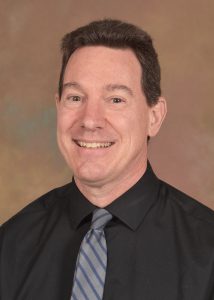2019 Speakers
July 5 Sam Hackler
Growing Up in East Jaffrey in the 1950’s
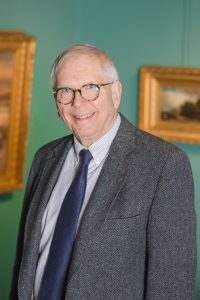
Sam invites you to walk with him through downtown East Jaffrey in the 1950’s. Along the way he will pepper his talk with stories, anecdotes, and other fond memories that took place during his early years. You’ll meet some of the folks who made a difference in the town and will learn how East Jaffrey was a vibrant and inclusive community that challenged young people with its amazing spirit and activities.
Beginning with St. Patrick’s Church on Main Street, Sam will share his memories and reflections on growing up in the post-war period. He’ll discuss how the people, places, and events of these times molded his life as a “Jaffrey kid.” He’ll explain how their contributions made East Jaffrey the largest town in Cheshire County in the 1940’s. Community was always important and the Jaffrey area provided the leadership and fellowship that made this a reality.
Sam Hackler is a graduate of Jaffrey’s Conant High School. He attended Babson College and the University of New Hampshire. In 1973, after teaching middle school for a few years, he founded Hackler Chrysler Plymouth in Milford, New Hampshire. In 1983, he opened New Hampshire Antique Co-op in Milford, a family business now in its 36th year.
Sam’s sense of community has led him to join many local town boards, organizations, and associations. He served as director of Monadnock Community Bank; is a former president of the Thorndike Pond Conservation Association; and was a founding member of the former Granite State Antique and Appraisers Association. Currently, Sam is a member of the Jaffrey Economic Development Council and is an officer of the Jaffrey Center Village Improvement Society. Sam lives in Peterborough with his wife Eileen.
July 12 Robert Goodby
The First to See Monadnock
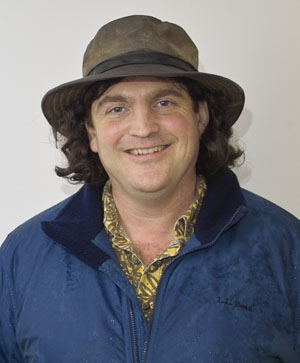
More than 12,000 years ago, small groups of Paleoindians endured frigid winters on the edge of a small river in what would become Keene, New Hampshire. In 2009, an archaeological survey for the new Keene Middle School discovered the remains of their stay and brought to light one of the oldest Native American sites in New England. The remarkably intact site produced evidence of four separate dwellings containing over 200 stone tools and fragments of burned animal bone. These early people, rather than being isolated stone-age nomads, were part of a social network that extended across much of northeastern North America. The discovery and excavation of the site was required by the National Historic Preservation Act, a frequently maligned piece of legislation that in this instance worked to save an irreplaceable piece of the human story in the Monadnock region.
Robert Goodby is Professor of Anthropology and Director of the Honors Program at Franklin Pierce University. He has a Ph.D. in anthropology from Brown University and over thirty years of experience excavating Native American archaeological sites. He is a past president of the New Hampshire Archaeological Society, a former Trustee of the Mount Kearsarge Indian Museum, and served on the New Hampshire Commission on Native American Affairs. He has directed over three hundred archaeological studies authorized by the National Historic Preservation Act and his work has appeared in anthropological journals and in anthologies published by the Smithsonian Institution Press and University Press of New England. He has presented more than a hundred talks for the New Hampshire Humanities “Humanities to Go” program, and every fall speaks to students at the Keene Middle School about the Tenant Swamp Paleoindian site.
July 19 Anne Peirce
How Florence Nightingale Saved the British Army
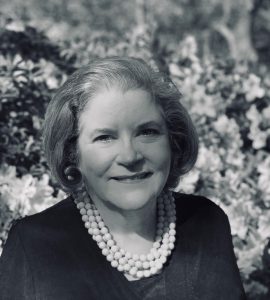
Nightingale is best known as the founder of modern nursing. What is less well known is how she used her prodigious talents as a statistician and social reformer to improve the health and welfare of the British soldier. In the Crimean War more soldiers died of disease than of war wounds. Nightingale used nursing care, proper nutrition, and effective sanitation to save thousands of soldiers. To garner support and resources from the British Government, she successfully pioneered methods of applied statistical analysis, resulting in her being named the first female member of the Royal Statistical Society. The changes she fought for on the battlefields of Crimea led to worldwide improvement in hospitals, both civilian and military, and in the overall lives of British military personnel.
Anne Griswold Peirce, RN, PhD has worked in nursing education over the last 36 years at Columbia University, University of Mississippi Medical Center, Seton Hall University and Adelphi University. Anne has coauthored two textbooks — the most recent on Ethics is in its second edition. She is also the founding editor of the Springer journal; Clinical Nurse Scholar. She has contributed to numerous nursing textbooks and journals on ethics, legal issues, stress and coping, complexity theory, elderly care, and professional nursing. Her most recent article (2019) focuses on how modern technologies, such as artificial intelligence and genomics, create ethical conflicts for nurses. Her individually funded research totals approximately one half million dollars and in addition, she has served as co-investigator of NIH funded studies, including the Jackson Heart Study. She currently belongs to the Eastern Nursing Research Society and Sigma Theta Tau, and numerous other professional organizations and boards in the field of nursing. In addition to nursing organizations, Anne is a former director at Hillenbrand Industries (NYSE:HB).
Her talk is derived from her book The Words of Florence Nightingale: Lessor Saint, Philosopher, Social Activist, Political Reformer, and Accidental Nurse.
July 26 Jamie Trowbridge
The Survival of a Small Media Company – With a Little Yankee Ingenuity
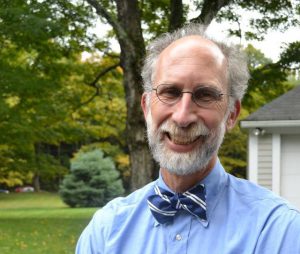
Over the last twenty years the media industry has been disrupted by the introduction of new digital media. The constantly changing habits of media consumers and the dramatic shifts in how advertisers direct their marketing budgets has forced those managing media enterprises to shoot at a moving target. New media technology is continually being introduced, and it’s never clear at the outset what formats will take off and what will fizzle out. That makes it especially difficult for small media companies with limited resources to decide how to invest. Yankee Publishing in Dublin has been navigating these stormy waters, keeping its head above water through innovating and diversifying, even as its legacy business erodes. The publisher of Yankee, The Old Farmer’s Almanac, and New Hampshire Magazine has, since its founding in 1935, been different from other publishers. Throughout its history that difference has helped Yankee Publishing survive.
Jamie Trowbridge is President and CEO of Yankee Publishing, publisher of Yankee Magazine, The Old Farmer’s Almanac, New Hampshire Magazine, and other publications and websites. It is located in Dublin, New Hampshire. As a grandson of the founder, Jamie is committed to keeping the company a successful and independent business.
August 2 Paul Jenkins
Why The Beatles Mattered and Still Matter
My presentation demonstrates not only why the Beatles were musically important and influential, but also how they contributed to the culture of the decade. Specific elements include the importance of the Beatles group ethos, the quality of their melodies, the nature of their lyrics, their studio recording innovations, how they perfected the album form, and their contemporary and ongoing influence on the worlds of fashion, film, business, art, and spirituality.
Paul Jenkins is the University Librarian at Franklin Pierce University and has been working in higher education for more than 30 years. In addition to his duties as a library director, Jenkins has also taught courses on Charles Dickens, the history of American Protest Music, and the Beatles. He has published more than twenty articles on librarianship and music, and is the author of three books, including Teaching the Beatles which appeared in 2018. Born in 1961, Jenkins has never known a world that did not include the Beatles.
August 9 Grace Aldrich
Exploring Stories of Race, Belonging, and Trauma

The codified story of race constructed during the founding of the United States originated in Britain’s American colonies. That is when the legal invention of whiteness first became embedded in U.S. law and institutions.
How has this invention been sifted through American history and handed down to us? How do these patterned explicit and implicit racial narratives animate our decisions, relationships, and bodies? The slippery, shifting, and impactful threads of race are sometimes hard to access. How then do we own our stories and hold ourselves to account?
With insight into traumatic memory from authors, and researchers including Joy Degruy, Resmaa Menakem, Bessel Van Der Kolk, Peter Levine, and others, Grace uses her experience as a healer and storyteller to share practices which transmute racism, restore freedom, build belonging, and deepen humanity.
Grace Aldrich lives in Dublin, NH. She is a mother, massage therapist, performer, and facilitator. In addition to local performances and workshops, she has recently co-facilitated programs at the Parliament of World Religions and Kripalu Center for Yoga and Health. In the last year she has also been grateful to co-create a popular regional library series called Talking about Race: Staying Curious, Moving Forward, and Being Part of the Solution.
August 16 Ernest Thompson
What’s Your Story?
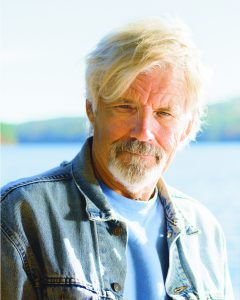
Everybody has one. Or two or two thousand. In Ernest Thompson’s nearly 50-year career, he has created, give or take, 40 plays of varying lengths, 30 or so screenplays, six manuscripts and more songs than he can count. Which adds up to a lot of characters. Where do they come from? And how does he get to know them so well?
When folks from all over the country attend Ernest’s renowned Write On Golden Pond workshops, held at his farm in New Hampshire, Ernest has a message for them: if you can’t think of a storyline or dream up vivid and complicated characters, go home; your family is full of them.
Storytelling is older than language; it exists in cave paintings and mothers’ la-la lullabies sung to their babies and, one would like to think, in birdsongs and whale songs, too. Sometimes the simplest stories can reach the widest audience. Ernest’s play, On Golden Pond, has been translated into 30 languages, Hebrew and Arabic among them — same story, different tongues, and universal experience. He also adapted that same story into an award-winning blockbuster movie, starring Henry Fonda, Katherine Hepburn and Jane Fonda. In his Amos Fortune Forum chat, Ernest will talk about how inspiration arrives at his door and keeps him awake at night, how all of us have talent, whether we choose to use it or not, and how, in the most alarmingly divisive and bleakest of times, sharing stories is more essential than ever.
Ernest’s work has won an Oscar, a Golden Globe, a Writers Guild Award and been nominated for a Tony, an Emmy and a BAFTA. He has directed, written for and/or acted — on Broadway, TV and the big screen — with 15 other Oscar winners or nominees, and could fill an evening with those stories alone. His newest film, Parallel America, starring New Hampshire’s own Gordon Clapp, Lisa Bostnar, John Davidson and Ernest, too, is in preproduction and open to investors, volunteers and anyone passionate about putting his or her patriotism on the line and making a difference. And telling a great story.


